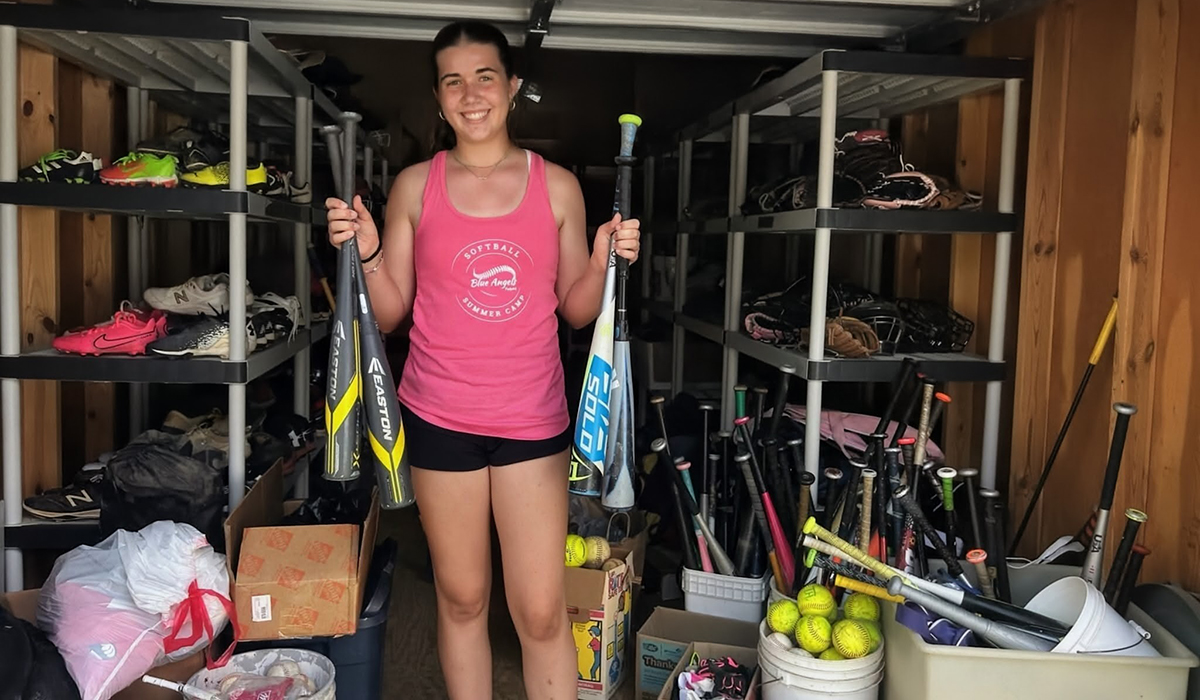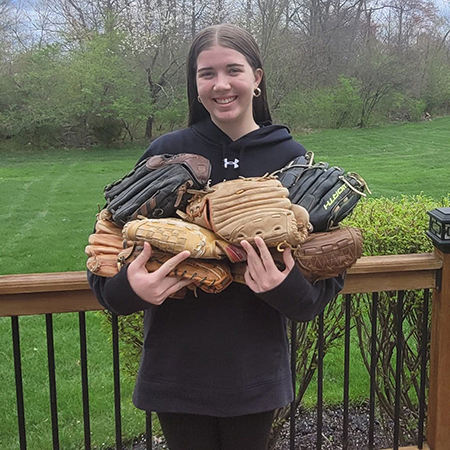For the Love of the Game

Meet Daily Point of Light Award honoree Molly Harrington. Read her story, and nominate an outstanding volunteer or family as a Daily Point of Light.
From the time she could join a T-ball league, 16-year-old Molly Harrington has enjoyed playing softball. Then, a year before the pandemic, she started playing volleyball. Being on sports teams has been an important part of her life, but it’s not always an option for everyone.
Youth sports participation has been on a downward trend, and for many families, costs are a big factor in whether or not their kids can play.
Even basics like a baseball mitt or a pair of basketball shoes can be out of reach, especially when those costs come on top of participation fees, travel expenses, uniforms and other pop-up costs.
Molly’s older sister Katie founded Play It Forward in 2018 to remove financial barriers to sports by collecting and giving away used gear so no kid has to sit on the sidelines. While she’s been a volunteer from the beginning, Molly took over as community director in 2023 after Katie graduated. She’s still on a driver’s permit, so she appreciates the help and dedication their dad has shown the initiative over the years as well.
It’s a family affair. Aside from the occasional assistance of friends when they need extra help, it’s just the two of them. Since the beginning, the organization has facilitated the donation of around 10,800 items that have equipped more than 1,500 kids across 10 towns. Game on.
What inspires you to volunteer?
It makes me feel good to contribute to the community, because the community does so much for me. Kids sometimes can’t afford necessary equipment for sports, and being able to give it to them for free is really nice, because they get an opportunity to play. It just makes me feel really good about myself.

Tell us about your volunteer role with Play It Forward.
We have an equipment shed at our local baseball and softball fields, and once or twice a month, we’ll clean it out and make sure donations are organized. People have keys to the shed, and if children need equipment, they can access it. There are sections for cleats, catchers’ gear, bags, socks, clothes, softballs and baseballs.
When people need it, they can get it. If people want to donate–if they’ve grown out something or they don’t play the sport anymore–we have a bin outside of the shed to leave things in when we’re not doing a donation event. Then, when we come to organize the shed, we clean and add it. If people want to give anything back because they’ve either grown out it or they no longer play the sport, we accept the donations back as well.
I promote donations on social media and to friends in sports. It mainly spreads by word-of-mouth. A lot of friends have donated equipment, and they keep donating, because they have younger siblings. They always find equipment. I also schedule and run donation drops and times for kids to pick up their new gear.
You’ve been participating in sports for a long time. What have you gained, and why do you think sports are so important for young people to participate in?
It teaches you a lot of life lessons, and you build a lot of relationships. I’ve been on a bunch of sports teams. I’ve played other sports like basketball and soccer, and it’s given me some of my really close friends. It also teaches you what it means to be part of a team and how to work together. That’s one reason I started getting interested in studying hospitality. I want to work with people. I like working as a team.
What’s been the most rewarding part of your work?
As years go on, it gets more expensive to play sports as equipment costs go up. We’ve met many of the families who have benefitted from Play It Forward, and I really enjoy seeing kids have the opportunity to play the sport they love. Many times, younger kids are just trying out a new sport and may or may not like it. Giving kids the opportunity to try something without a price barrier feels great, too.
What have you learned through your experiences as a volunteer?
I work mostly with my dad, but I’ve also worked with local coaches. It’s taught me a lot about communication skills and connecting with families. Sometimes, we’ll meet up with families to give them equipment, and it’s really nice to meet them.
Why is it important for others to get involved with causes they care about?
It brings people together for a good cause, and it helps people in the community connect. Currently, the softball and baseball fields are being renovated, so it’s hard to connect with people. When my sister and I did it together, we would set up tables and were able to get to know everyone and see how other people’s lives are.
Do you have any advice for people who want to start volunteering or even how they might be able to take steps to address this issue where they live?
When my sister started, it wasn’t a big program. But with promotion and time, the impact has grown. Start small. Every little thing makes an impact on the community.
If you have space in your community to hold equipment, promote ways to donate. One person’s trash is another person’s treasure. And talk to your local Little League and sports programs. A lot of people throw out old equipment other kids might need. It’s wasteful, and it could be making an impact if you explain that to people.
What do you want people to learn from your story?
A small step in your community can make a huge impact, and it makes you feel good about yourself. It’s always good to help other people out, especially if you can relate to the situation they’re in. If, as a kid, you didn’t have a certain opportunity, help out other kids so they don’t have to experience that.
Do you want to make a difference in your community like Molly? Find local volunteer opportunities.